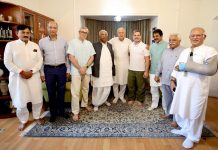
At 90, after a lifetime of bearing malice to one and all, writer and columnist Khushwant Singh has turned contemplative. For a man who has always revelled in writing obituaries, he is ruminating about death in his latest book, Death at my Doorstep. He often wonders how long he will continue the way he is now. “I want to hang on but I know it’s close,” says the grand old Sardar in an interview. Excerpts:
Have you thought of death often enough earlier, or are you thinking more about it now?
I know it’s coming close. I often look out of the window and look at the tree and wonder how long I’ll be able to see it. I’ve seen it grow with me. I’d like to hang on but I question what will remain of me — some memory, some book. What I have done is try and shed my emotional baggage. I’ve already given away everything I have because I don’t want to leave a will behind. I’ve parted with whatever I have, including my monthly income. I have not a penny with me.
What do you mean ‘it’s coming close’?
Well, age-wise. I’m mentally fit but am losing my strength. I saw my wife lose her mind and then I saw her become a vegetable. In the end, she couldn’t move at all. I have to prepare for that possibility.
Do you feel life ebbing out of you?
Yes, I falter. I’m unsteady on my feet and have to frequently touch the wall. I can’t hear very well and I know life is ebbing out because I have to get up every two hours to pee. Two years ago, I fell in Kasauli. I fell face down, without rhyme or reason and thought the end had come. I was crawling around for half an hour and just couldn’t stand up. I thought I should say a quick prayer but then thought to myself, no that would be a lie since I don’t believe in god. I then thought of Iqbal’s line — why did you expel me from the Garden of Paradise, there is still a lot of work left… now you wait for me.
Do you believe in euthanasia?
Absolutely. You have every right to take your own life, every right to end your own existence. I’m still mentally there but if I had the means, I would like to acquire some cyanide. I can’t ask the doctor and can’t buy it from a chemist. I often wonder where the Tamil Tigers get their supply from? I’ve seen them wear the capsules around their necks.
You are actually saying you would like to acquire some cyanide if you could?
Yes. I believe death comes very quickly, in an instant. I won’t want to become a vegetable. I’ve seen my wife suffering. The other day, Nirad Chaudhary’s son told me that his father had crossed the century mark but he wasn’t really there for a year.
You have also been very irreverent about death and about the dead. Are you scared the same may be done to you?
(Laughs) Not at all. It doesn’t bother me. I won’t be around to know. I’ve always been irreverent and have written obituaries not epitaphs. I wrote my own obituary when I was still in my twenties.
Is it fair to criticise the dead? They can’t defend themselves.
(Laughs again) Well, you can’t be dragged to court. Look, it’s best to be easy about death. It’s not unique. I’m not marked out as someone special. Death has to come. I remember this incident when I was at the Indian High Commission in London. I had a visitor from Kenyan and Kenyan Undertakers after the death of the Rani of Mandi. They came to us because she had desired to be cremated in a saree. They wanted to know how to drape a saree and the man went into a rage because I told him I only have some experience of how to take them off. He was so livid he went and complained to Krishna Menon, the High Commissioner. Even when I wrote my own obit, I laughed about it. I said I’d been hoping that there would be a lot of people at my funeral. I wondered how my lawyer friends were reacting to the news. I ended saying that since there were no people who came and I was left alone with the hearse, I decided to come back.
Yes, but when another journalist wrote your obituary, you didn’t take that too well?
I was okay with it but my wife was upset because people only read the first para of that obit and we were flooded with phone calls and telegrams.

How did you take your wife’s death?
We were expecting it for a year or so. She slowly, slowly went down to becoming a vegetable. But when it did come, it came as a shock even though I was prepared for it. She died in the morning and we cremated her without any religious ceremony. I returned home and sat in the chair all night. I just couldn’t sleep.
Also, people were just not leaving me alone even though I had said through the newspapers that I would be grateful if people didn’t call or send messages. I packed my bags and went to Goa for 10 days where I sunbathed and drank.
Do you discuss death with your children?
Each time, I’m feeling a bit down, I see the worry on their faces. It worries them more than it worries me but I don’t talk to them about it.
Do you believe in rebirth, in communicating with the dead?
It’s bullshit. Planchettes are make believe. I don’t even believe in god because there is no basis for that belief.
How would you like to be remembered after death?
As a man who always spoke his mind, irrespective of the consequences.
What would you miss the most?
Good sex. I already miss good sex and it’s been missing for some time. The day you can’t have sex is really the time for a man to go. But yes, I fantasise.
Romance?
Romance dried up a long time ago. I don’t miss anyone, really. Each time I hear about some friend being with someone else, I feel I’ve shed some more emotional baggage.
Again, you think death is at your doorstep?
I would like to hang on but I know it’s close.
[box]
From the death sentence to the gallows
 Death at my doorstep (Roli Books) puts together the obituaries written by Khushwant Singh, with a fresh introduction by him. A snapshot from his obituary of Bhutto:
Death at my doorstep (Roli Books) puts together the obituaries written by Khushwant Singh, with a fresh introduction by him. A snapshot from his obituary of Bhutto:
At 4 pm a magistrate arrived with writing material and asked Bhutto to write his last will…Bhutto spent an hour or more writing out his last message. No one will ever know what he wrote because with his own cigar lighter he burnt the paper to ashes. At 6 pm he asked for hot water and his shaving set saying, “I don’t want to die looking like a mullah.” And after he had erased the growth on his chin, he looked into the mirror and remarked in self-mockery, “Now I look like a third world leader
[/box]













